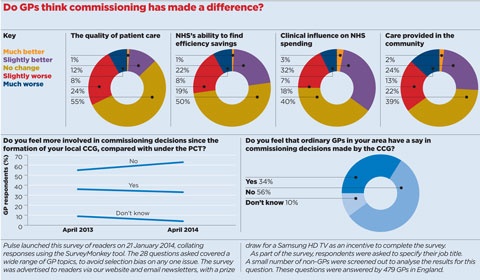GPs feel even less involved in commissioning one year after CCGs took control

Exclusive Almost two-thirds of GPs feel no more involved in commissioning under CCGs than under PCTs, revealing an increasing disenchantment with the NHS reforms 12 months after they were introduced, a Pulse survey has found.
Pulse’s snapshot survey of 479 GPs in England on the eve of the first anniversary of the reforms shows that nearly 63% of respondents feel they did not have any more involvement now than they did under PCTs – a rise of eight percentage points on the same results last year.
Only 33% said they feel more involved with commissioning than they did with PCTs, compared with 36% last year.
The results are part of a major Pulse investigation into the commissioning reforms one year on, which last week revealed that GP representation on boards had decreased since 2012, when CCGs were in shadow form
GP leaders have said that GPs are feeling increasingly disillusioned, warning that there is a disconnect between practitioners and CCGs, while even commissioning leaders have warned that there is little difference between some CCGs and PCTs.
Related stories
Analysis: How managers seized control of commissioning
Special report: The NHS reforms one year on
Dr Michael Dixon: ‘For heaven’s sakes, let CCGs lead’
A year since the official launch of the CCGs, GP commissioning has made no difference
The survey found that more than half – 55% – of the GPs surveyed said that they did not feel that ordinary GPs in their area had a say in the commissioning decisions made by the CCG.
It also revealed that just 13% felt that the switch to GP commissioning had a positive effect on patient care, while 38% felt the variation in treatments provided in different areas was even more acute.

The results are worrying for advocates of the reforms, which former health secretary Andrew Lansley said in September 2010 was designed to ‘give you and your colleagues in general practice the responsibility to shape services’.
Dr Robert Morley, chair of the BMA’s GPC contracts and regulations subcommittee, said: ‘Most GPs have a CCG that tries to engage and a constitution that is fit-for-purpose but still feel that decisions are made by the leadership of CCGs, heavily influenced by NHS England and commissioning support units and it is only lip service to how grassroots GPs are involved.’
Dr James Kingsland, president of the National Association of Primary Care, warned of the concern amongst GPs that not much had changed.
He said: ‘Many of my colleagues are saying it is difficult to know the difference between the CCG and the PCT in terms of personnel, outlook, delivery style, process. How does transformational change occur in a system that looks very similar to the last?’
Pulse July survey
Take our July 2025 survey to potentially win £1.000 worth of tokens











